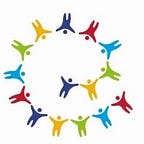FROM TRAGEDY TO HOPE
The story of Erion Krasniqi
Erion Krasniqi was born in January 1999 in a city named Fushe Kosova (Kosovo Polje) in Kosovo. Kosovo then was under Serbian rule, in the midst of a civil war. Erion is part of the Albanian community in Kosovo — the majority in Kosovo but a minority within the wider Serbia.
In the 1990s, the Albanians in Kosovo were being persecuted by the Serbian government: losing their jobs, facing educational restrictions and more. Throughout the 1990s there were skirmishes between the ethnic groups. But the situation escalated into a war in 1998 when the Serbian government decided to send their army into Kosovo, creating a full-scale conflict.
Erion’s father was a doctor. During the war, he went around to different villages stricken by war to help the people there. Because of this, the Serbian military put him on their wanted list.
On April 1, Fushe Kosova was surrounded by Serbian forces. Erion (still just a baby), two siblings and his mother had left town beforehand. But his father and the rest of the family were still at. The exact details remain unknown, but during the coming days, Serbian soldiers came to the Krasniqi house and killed five members of Erion’s family, including his father.
By the end of 1999, NATO intervened in the conflict and gave Kosovo special status under the UN. In 2008, Kosovo got independence, with an Albanian majority and a small Serbian minority. Serbia doesn’t recognize Kosovo’s independence, and there are still many tensions between ethnic Albanians and ethnic Serbs.
From childhood, Erion thought constantly about the war. He and other Albanian children were taught to hate and fear Serbs. As a teenager, the fear moved completely towards hate and extremist thoughts towards Serbs — even though he had no interaction with the actual Serb minority. He became seriously violent towards others in his hometown (fellow Albanians), all based on the dream of getting revenge on Serbs.
Towards the end of high school, Erion started to hear stories from his grandparents about the time before the war — when Albanians and Serbians got along. That was a wake-up call to start to see how much harm he was doing to himself and others by living a violent lifestyle and being filled with hate.
In the three years after Erion gave up violence, he still had no interactions with actual Serbs. But in 2019, Erion randomly found a training with a Kosovo organization named Local Peace, in partnership with the Youth Peace Ambassadors Network. He signed up not to meet Serbs — he just wanted to have fun and experience something new. But when he met Serbs for the first time and felt all the fear of being in a Serbian-majority city, made me realized how they might feel living in areas surrounded by Albanians. He started to realize that the picture he held in his mind of Serbians wasn’t actually true — it was all based on assumptions. Meeting them, and hearing their experiences and opinions helped him realize that both sides suffered during the war. He saw a documentary about young Serbians and Albanians, filmed directly before and directly after the war — and some of the participants filmed before the war were missing afterward because they’d been killed.
Erion realized how one-sided stories can be, and how easy it can be to overlook the experiences of the other side. Hearing the stories from the Serbian participants and what happened to their families made him want to investigate the crimes from the war, published by neutral media. This let him realize the real scale of destruction caused by the war.
Today Erion wants to run workshops that will create safe spaces for young Albanians and Serbs from Kosovo to meet without fear, learn together and share their experiences. For him, the most important thing is to educate young people about how destructive the war really was for all sides and to try to make them communicate and share the pain with one another. This will allow the people of Kosovo to move towards a better future, where the war is remembered but is not repeated.
Written by: Erion Kransiqi and George Stewens
This story was created during the Training Course “Peaceful Response-Training Course on Peaceful crisis management and communication”.
PEACE(FUL) RESPONSE is a project financed by the European Union’s Erasmus+ Programme and implemented by Peace Up! in cooperation with the Youth Peace Ambassadors Network.
The content of page represents the views of the author only and is their sole responsibility. The European Commission does not accept any responsibility for use that may be made of the information it contains.
